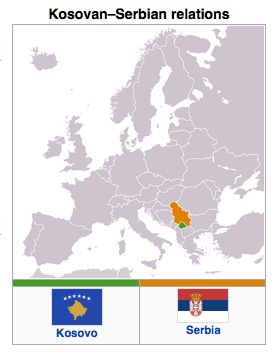Serbia Rejects EU’s Terms On Kosovo
By Marija Ristic
Prime Minister Dacic deems new EU conditions on Kosovo unacceptable, after Brussels urges Serbia to respect Kosovo’s territorial integrity.
Serbian Prime Minister Ivica Dacic said he was “seriously disturbed” by the new European Commission Enlargement Strategy, which has told Belgrade it must respect Kosovo’s territorial integrity if it wishes to progress towards EU membership.

Serbia does not recognise the independence of its former province, declared in 2008.
“I am deeply and seriously disturbed by these requirements, which instead of helping [Serbia and Kosovo] to continue their dialogue can actually end the talks,” Dacic said after receiving the EU Progress Report on Serbia.
“Maybe it would have been more honest [of the EU] to request direct recognition of Kosovo’s independence than to ask us to respect their state integrity,” he added.
Dacic’s irate reaction came after the EU Commissioner for Enlargement, Stefan Fule, called for a visible and sustainable improvement in relations between Serbia and Kosovo, including the respect of Kosovo’s territorial integrity.
“This process should gradually result in the full normalisation of relations between Serbia and Kosovo with the prospect of both being able to fully exercise their rights and fulfil their responsibilities within the European Union,” Fule said.
“Addressing the problems in [Serb-run] northern Kosovo, while respecting the territorial integrity of Kosovo and the particular needs of the local population, will be an essential element of this process,” he added, referring to the northern sliver of Kosovo where Belgrade effectively runs local authorities.
The EU’s Enlargement Strategy acknowledges the results of the Kosovo-Serbia dialogue in terms of agreements on regional cooperation, on the representation of Kosovo at regional meetings and on management of the border.
But it notes that implementation of the agreements has been uneven.
“Serbia’s new leadership has underlined its commitment to implement all agreements already reached in the dialogue with Pristina as well as to begin tackling the broader political issues,” the report says.
“Serbia still needs to achieve further progress towards a visible and sustainable improvement of relations with Kosovo, the key priority set out in the Commission Opinion on Serbia’s membership application,” it adds.
“Following the elections and a new leadership in Serbia taking up office, Serbia needs to continue to engage constructively in the next phase of the dialogue in order to achieve further progress towards a visible and sustainable improvement of relations with Kosovo,” it continues.
